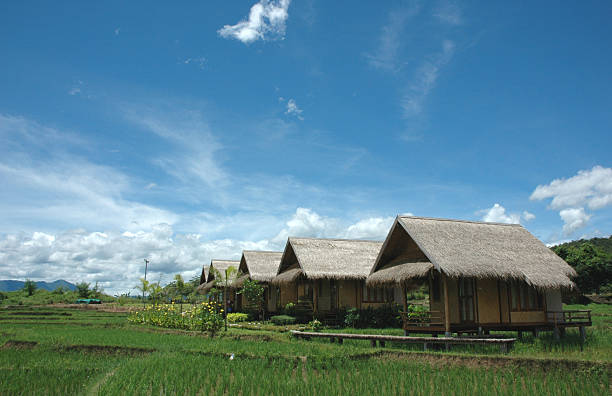Yam, a versatile and nutritious tuber, holds a place of exceptional importance in the heart of Nigeria’s economy and culture. As one of the largest yam producers in the world, Nigeria boasts a rich tradition of cultivating and consuming this staple crop. Beyond its significance as a dietary staple, yam production has also emerged as a lucrative industry, contributing to the country’s economic growth and providing employment opportunities for many. In this context, we delve into the success stories of top Nigerian companies that have harnessed the potential of yam, transforming it into a thriving business venture.
This exploration takes us on a journey to discover the leading players in Nigeria’s yam industry, their innovative practices, and the factors that have led to their remarkable financial success. We will delve into the techniques employed by these companies in yam cultivation, processing, and distribution. By examining the strategies adopted for marketing and branding, we aim to unravel the secrets behind their ability to reach and capture an extensive market share.
However, the road to prosperity in the yam sector is not without its challenges. Adverse weather conditions, infrastructural constraints, and market competition pose hurdles that these companies have had to navigate skillfully. We will explore how they have overcome these obstacles and implemented forward-thinking solutions to maintain their edge in the industry.
Overview of Yam Industry in Nigeria
Importance of Yam as a Staple Food:
Yam holds immense cultural, social, and economic significance in Nigeria. As a staple food, it plays a central role in the diets of millions of Nigerians, particularly in the southern and middle belt regions of the country. Yam is not only a source of sustenance but also deeply embedded in cultural practices, ceremonies, and festivals.
Yam Production and Consumption Statistics:
1. Production: Nigeria is the largest yam producer in the world, accounting for over 70% of global production. The country’s diverse agro-ecological zones make it suitable for yam cultivation, with the major producing states being Benue, Cross River, Delta, Edo, and Oyo.
2. Consumption: Yam consumption is exceptionally high in Nigeria, with per capita consumption levels significantly surpassing many other staple foods. It is commonly prepared in various forms, including pounded yam, yam porridge, and yam fries.
Challenges and Opportunities in the Yam Industry:
1. Post-Harvest Losses: Yam is perishable and highly susceptible to post-harvest losses due to inadequate storage facilities and transportation challenges. This results in significant economic losses for farmers and the industry as a whole.
2. Infrastructural Constraints: Inadequate road networks and transportation systems hinder the efficient movement of yam from rural farming areas to urban markets and export terminals.
3. Export Potential: Despite being a major producer, Nigeria has yet to fully tap into the international yam export market. Exploring export opportunities could boost revenue and improve the livelihoods of farmers.
4. Value Addition: The yam industry has potential for value addition through processing, which could create more diverse products and increase profitability.
Government Initiatives:
The Nigerian government recognizes the importance of yam in its economy and has introduced several initiatives to support the industry:
1. Yam Value Chain Development Program: The government has implemented programs to enhance yam production, storage, and marketing to increase profitability for farmers and stakeholders.
2. Export Promotion: The government is actively encouraging yam export by supporting exporters and implementing policies to meet international quality standards.
3. Research and Development: Investments in agricultural research and technology are aimed at improving yam varieties and farming techniques to boost productivity and mitigate challenges.
Role of the Private Sector:
Private companies in Nigeria’s yam industry play a crucial role in driving growth and innovation. By investing in modern farming practices, post-harvest technologies, and efficient distribution networks, these companies contribute to the overall success of the yam industry in Nigeria. Moreover, their efforts in branding and marketing have the potential to elevate Nigerian yam products in both domestic and international markets.
some well-established Nigerian companies known for their significant contributions to the yam industry

Dundun Nation:
Dundun Nation, founded in 2016 by Bayo Adedeji and Kemi Adedeji, has rapidly established itself as a prominent player in the Nigerian food industry. The company’s main specialty is fried yam, a popular and beloved Nigerian dish. With a strong emphasis on quality and taste, Dundun Nation has garnered a loyal customer base, contributing to its rapid growth.
The company sources its yams from local farmers, supporting the local agricultural community while ensuring a steady supply of fresh yams for their dishes. Dundun Nation takes pride in using traditional farming techniques to grow its yams, ensuring the authenticity and originality of their fried yam recipes.
Dundun Nation’s market reach is broad, with over 10 branches spread across Nigeria. The company offers its fried yam both through its own stores and online platforms, providing convenient access to their delectable dishes. Additionally, they have partnered with various restaurants and food delivery services to further extend their distribution channels, making their products more accessible to consumers.
While Dundun Nation’s financial details have not been publicly disclosed, their expansion and growing popularity within a short time suggest that the company is experiencing considerable financial success.
Flour Mills of Nigeria Plc:
Background and History of the Company:
Flour Mills of Nigeria Plc (FMN) is one of the oldest and largest agro-allied companies in Nigeria. It was established in 1960 as a private limited company and later became a public limited company in 1978. FMN’s initial focus was on flour milling, but over the years, they diversified their operations to include various agricultural and food processing ventures, including yam flour production.
Yam Production and Farming Techniques Employed:
Flour Mills of Nigeria does not directly engage in yam farming. Instead, they source yams from local farmers and yam-producing communities across Nigeria. The farmers use traditional farming techniques, and FMN ensures that the yams meet the required quality standards for processing.
Market Reach and Distribution Channels:
FMN has an extensive market reach within Nigeria and beyond. Their yam flour and other products are distributed through an established network of distributors, wholesalers, and retailers across the country. Additionally, they export yam flour to other West African countries and beyond.
Psaltry International Company Limited:
Background and History of the Company:
Psaltry International Company Limited was established in 2005. It is a leading agro-processing company in Nigeria, specializing in yam production and processing. The company’s commitment to quality and innovation has earned it a reputation as a key player in the yam industry.
Yam Production and Farming Techniques Employed:
Psaltry engages in yam farming by cultivating their yam plantations. They employ modern farming techniques to ensure optimal productivity and high-quality yam yields. The company also partners with local farmers, providing them with training and support to adopt best practices in yam farming.
Market Reach and Distribution Channels:
Psaltry has a strong market presence in Nigeria and other countries. They supply yam flour, yam chips, and other yam-based products to domestic markets through partnerships with distributors and retail outlets. Additionally, they export yam products to international markets, particularly within the West African region.
Ayoola Foods Limited:
Background and History of the Company:
Ayoola Foods Limited was established in 1991. It is a well-known Nigerian food processing company that has diversified its product range to include yam-based foods. Their commitment to quality and innovation has made them a popular choice among consumers.
Yam Production and Farming Techniques Employed:
Ayoola Foods Limited does not directly engage in yam farming. Instead, they source yams from local farmers and yam-producing regions across Nigeria. The yams are processed in their modern facilities using advanced techniques to ensure high-quality yam-based products.
Market Reach and Distribution Channels:
Ayoola Foods has an extensive market reach across Nigeria. Their yam-based products, including yam flour, yam chips, and other convenience foods, are distributed through established channels of wholesalers, retailers, and supermarkets.
Conclusion
These are just a few of the many Nigerian companies that are making millions in yam. The yam business is a very profitable one in Nigeria, and these companies are just a few of the many that are taking advantage of this opportunity.
In addition to these companies, there are also many smaller yam businesses that are doing well. Yam is a staple food in Nigeria, and there is a large and growing demand for yam products. This makes the yam business a very attractive one for entrepreneurs.
If you are interested in starting a yam business, there are a few things you need to keep in mind. First, you need to make sure that you have a good understanding of the yam market. You need to know what types of yam products are in demand, and where you can sell them. Second, you need to make sure that you have a reliable source of yam. You need to be able to get the yam you need at a good price. Finally, you need to have a good marketing plan. You need to be able to reach your target customers and let them know about your products.
If you can do these things, you will be well on your way to starting a successful yam business.












